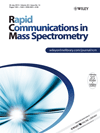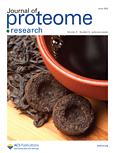
MOLECULAR & CELLULAR PROTEOMICS
Scope & Guideline
Elevating the discourse in molecular and cellular proteomics.
Introduction
Aims and Scopes
- Proteomic Methodologies:
The journal publishes research on advanced proteomic techniques, including mass spectrometry, phosphoproteomics, and glycoproteomics, which are essential for the detailed analysis of protein structures, functions, and interactions. - Clinical Applications of Proteomics:
A significant focus is placed on the clinical implications of proteomic findings, particularly in cancer research, where proteomic profiles can inform prognosis and treatment strategies. - Integrative Multi-Omics Approaches:
The integration of proteomics with genomics, transcriptomics, and metabolomics is a core area, facilitating comprehensive insights into biological systems and disease states. - Biomarker Discovery and Validation:
Molecular & Cellular Proteomics serves as a platform for discovering and validating biomarkers for various diseases, enhancing the potential for precision medicine. - Technological Innovations:
Papers often highlight novel tools and methodologies that push the boundaries of traditional proteomics, including single-cell proteomics, spatial proteomics, and advanced bioinformatics solutions.
Trending and Emerging
- Immunopeptidomics:
The field of immunopeptidomics is gaining traction, focusing on the identification and characterization of peptide-MHC interactions, which are critical for understanding immune responses and developing immunotherapies. - Single-Cell Proteomics:
There is an increasing emphasis on single-cell proteomics, allowing for the exploration of cellular heterogeneity and the identification of unique protein signatures at the individual cell level. - Post-Translational Modifications (PTMs):
Research on PTMs, particularly glycosylation and phosphorylation, is trending, as these modifications play crucial roles in protein function and regulation, influencing various biological processes and disease mechanisms. - Proteogenomics:
The integration of proteomics with genomics (proteogenomics) is emerging as a powerful approach for uncovering novel protein-coding genes and understanding the complexities of gene expression and regulation. - Microbiome and Host Interactions:
Studies exploring the proteomic aspects of microbiome-host interactions are on the rise, reflecting a growing interest in how these interactions influence health and disease.
Declining or Waning
- Basic Proteomics Techniques:
There appears to be a waning interest in basic proteomics techniques that do not incorporate advanced methodologies or multi-omics integrations, as the field increasingly values comprehensive and innovative approaches. - Research on Classical Cell Signaling Pathways:
Studies focusing solely on classical signaling pathways without integration with proteomic data have diminished, reflecting a move towards more complex analyses that consider multiple signaling networks and their interactions. - Descriptive Proteomics Studies:
There has been a reduction in purely descriptive studies that do not provide functional insights or clinical relevance, as the field shifts towards more impactful research that addresses specific biological questions.
Similar Journals

Biomarker Insights
Transforming health insights through groundbreaking research.Biomarker Insights, published by SAGE Publications Ltd, is a leading open-access journal dedicated to advancing the field of biomarker research and its applications in health and disease. With an ISSN of 1177-2719 and an E-ISSN of 1177-2719, this journal has been at the forefront of disseminating high-quality scientific findings since its inception in 2006. Based in New Zealand, it has achieved a notable impact within the academic community, ranking in Q2 for Biochemistry (medical) and Molecular Medicine, and Q1 in Pharmacology as of 2023. This positions Biomarker Insights as a critical resource for researchers, professionals, and students alike, looking to explore innovative methodologies and applications in biomarker discovery and validation. With a commitment to open access, the journal ensures that groundbreaking research is readily available to the global community, fostering collaboration and innovation in the ever-evolving field of biomedical sciences.

PROTEOMICS
Elevating the science of proteomics for a better tomorrow.PROTEOMICS is a leading journal focused on the rapidly evolving field of proteomics, published by WILEY in Germany. With a solid reputation established since its inception in 2001, it has continually contributed to the understanding of protein functions and interactions within biological systems. As part of its commitment to academic excellence, PROTEOMICS is ranked in the second quartile for both Biochemistry and Molecular Biology categories (2023), reflecting its significant influence in advancing research in these areas. Although it does not currently provide open access options, it remains a vital resource for researchers, professionals, and students keen to explore innovative methodologies and findings in proteomic research. By publishing groundbreaking studies that bridge theoretical knowledge with practical applications, PROTEOMICS plays a crucial role in enhancing our understanding of molecular processes and driving forward advancements in the life sciences.

RAPID COMMUNICATIONS IN MASS SPECTROMETRY
Elevating standards in analytical and organic chemistry.RAPID COMMUNICATIONS IN MASS SPECTROMETRY is a leading journal published by Wiley, focusing on the rapidly evolving field of mass spectrometry and its applications across various domains, including analytical, organic, and spectroscopy chemistry. With its ISSN 0951-4198 and an E-ISSN of 1097-0231, the journal has firmly established itself as a reputable source of innovative research since its inception in 1987, and is set to continue until 2024. As evidenced by its 2023 Scopus rankings, the journal occupies a solid position in the realms of analytical chemistry (Q3), organic chemistry (Q3), and spectroscopy (Q3), reflecting its impact among a diverse audience of researchers and professionals. Although it is not an open-access publication, the findings shared within its pages are pivotal for advancing knowledge and practical applications in mass spectrometry, making it an essential resource for students and experts aiming to stay abreast of the latest scientific developments.

JOURNAL OF PROTEOME RESEARCH
Transforming Proteomic Insights into ImpactJOURNAL OF PROTEOME RESEARCH is a premier publication in the field of proteomics, disseminating cutting-edge research and methodologies that drive advancements in biochemistry and molecular biology. Published by the American Chemical Society, this esteemed journal boasts a robust impact, as evidenced by its Q1 rankings in both Biochemistry and miscellaneous Chemistry categories for 2023. With a reputation bolstered by a solid Scopus ranking—#64 out of 408 in General Chemistry and #80 out of 438 in Biochemistry—the journal serves as an essential resource for researchers, professionals, and students aiming to deepen their understanding of protein functions and interactions in biological systems. Although it does not operate under an open-access model, the JOURNAL OF PROTEOME RESEARCH remains a critical platform for scholarly discourse, committed to publishing high-quality, peer-reviewed articles through 2024 and beyond. Scholars are encouraged to engage with the pioneering studies and reviews that shape the future of proteomics.

Cell Chemical Biology
Advancing the Frontiers of Chemical Biology.Cell Chemical Biology, published by Cell Press, stands at the forefront of interdisciplinary research in the realms of biochemistry, molecular biology, and pharmacology. With a robust impact factor evident in its prestigious Q1 quartile rankings across multiple categories including Clinical Biochemistry and Drug Discovery for 2023, this journal serves as a critical platform for disseminating cutting-edge scientific discoveries. As an Open Access publication, it ensures that vital research is accessible to a wide audience, fostering collaborations and driving innovation in the life sciences. Based in the United States, and featuring publications from 2016 to 2024, Cell Chemical Biology invites researchers, professionals, and students alike to contribute to its mission of advancing knowledge through rigorous peer-reviewed articles that address both fundamental and applied aspects of chemical biology.

BIOCHIMICA ET BIOPHYSICA ACTA-MOLECULAR BASIS OF DISEASE
Charting the Course of Disease MechanismsBIOCHIMICA ET BIOPHYSICA ACTA-MOLECULAR BASIS OF DISEASE, published by Elsevier, is a pivotal journal in the fields of Molecular Biology and Molecular Medicine, recognized for its high impact factor and robust ranking within Scopus categories, holding prestigious quartiles in Q1 for both disciplines as of 2023. With ISSN 0925-4439 and E-ISSN 1879-260X, this journal fosters cutting-edge research from 1990 to 2025, addressing the critical molecular mechanisms underlying human diseases. Its wide-ranging scope includes original research articles, reviews, and advanced theoretical insights, serving as an essential resource for researchers, clinicians, and students alike. The journal is based in the Netherlands, at RADARWEG 29, 1043 NX AMSTERDAM, and while it does not currently offer an open-access option, it continues to maintain a strong presence in the scientific community, enhancing our understanding of molecular processes in health and disease.

Molecular Systems Biology
Exploring the Intersection of Biology and TechnologyMolecular Systems Biology, published by SpringerNature, is a premier open access journal that has been a cornerstone in advancing the fields of biological science since its inception in 2005. With its ISSN 1744-4292, this journal exemplifies high scholarly standards, boasting an impressive suite of impact factors, including Q1 rankings across various disciplines such as Agricultural and Biological Sciences, Biochemistry, Genetics and Molecular Biology, and more, highlighting its significant contribution to the scientific community. The journal offers robust access options to facilitate innovative research dissemination, reaching a global audience while maintaining a commitment to fostering collaboration and dialogue among researchers, professionals, and students. With a focus on integrating quantitative approaches to biological systems, Molecular Systems Biology plays a vital role in addressing complex biological questions, paving the way for groundbreaking discoveries and advancements in healthcare, environmental sustainability, and functional genomics.

Cell Reports Methods
Elevating Methodological Standards in Biochemistry and BeyondCell Reports Methods is a cutting-edge journal published by CELL PRESS, focusing on innovative methodologies in the vast fields of biochemistry, genetics, biotechnology, and radiological sciences. Launched in 2021, it has rapidly ascended to attain a Q1 ranking across multiple disciplines in the latest 2023 metrics, reflecting its influential contribution to the scientific community. With an emphasis on practical and rigorous experimental approaches, this journal serves as a vital resource for researchers looking to advance their methodologies and collaborate on significant findings in their respective specialties. Despite not being an open-access publication, Cell Reports Methods ensures broad accessibility through institutional subscriptions, allowing researchers from various backgrounds to engage with high-quality scholarly work. The journal presents a unique platform for sharing insights from interdisciplinary methods that foster innovation and discovery, ultimately shaping the future of scientific research.

PROTEIN JOURNAL
Transforming Insights into Biomedical ApplicationsProtein Journal, published by Springer, stands as a significant academic resource in the fields of Analytical Chemistry, Biochemistry, Bioengineering, and Organic Chemistry. Since its inception in 1996, the journal has dedicated itself to the dissemination of high-quality research focused on protein chemistry and its biomedical applications. With an impressive impact reflected in its classification as a Q2 journal in Analytical Chemistry and Q3 in both Biochemistry and Bioengineering as of 2023, it provides an essential platform for researchers and practitioners to share their findings. The journal embraces the open-access model, enhancing accessibility to cutting-edge research. The Protein Journal is crucial for academicians, industry professionals, and students, catering to their need for rigorous scientific discourse and innovative discoveries in protein studies. With an established track record of converging over two decades of knowledge and research, it continues to influence and shape the advancements in this vital area of science.

Molecular Omics
Exploring the Frontiers of Molecular BiologyMolecular Omics is a premier, peer-reviewed journal published by the Royal Society of Chemistry, focusing on the interdisciplinary field of molecular biology with significant implications for biochemistry and genetics. With an E-ISSN of 2515-4184, this journal has been dedicated to disseminating high-quality research since its inception in 2018, maintaining an impressive trajectory in academic contributions until 2024. Currently, it holds a Q2 quartile ranking in both Biochemistry and Genetics, alongside a Q3 ranking in Molecular Biology for 2023, highlighting its relevance and influence in these domains. The journal is accessible as an open access publication, promoting the widespread dissemination of groundbreaking research. As part of a vibrant academic community, Molecular Omics aims to bridge fundamental and applied science, appealing to researchers, professionals, and students eager to expand their knowledge on molecular mechanisms and technologies that shape the future of biological research.